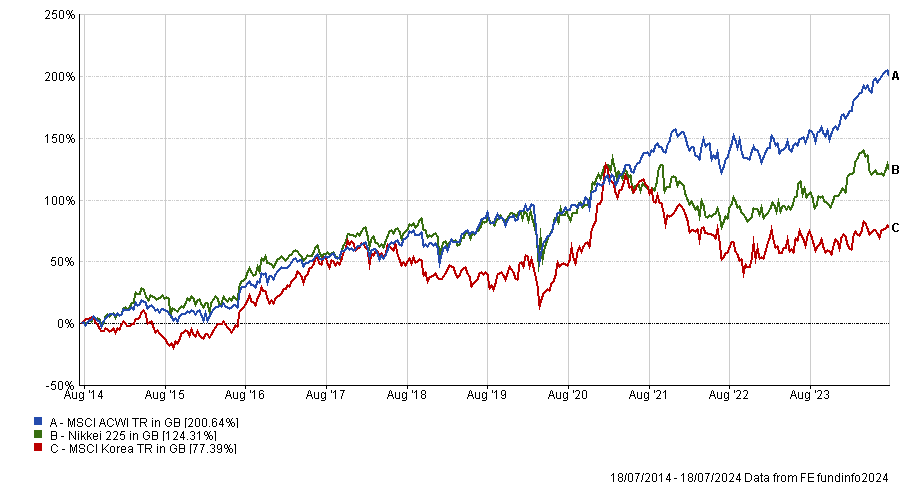Corporate governance reforms have brought Japan’s 20-year bear market to an end and propelled its stock market to all-time highs. Now fund managers are wondering whether a similar phenomenon could happen in nearby South Korea, where poor corporate governance has led to an entrenched ‘Korea discount’.
Korean management teams have not historically given much thought to capital efficiency and balance sheet management, said Ben Preston, head of Orbis Investments’ global sector research team, but “they’ve looked across the water to Japan” and seen a rising stock market and international investors pouring money into Japan’s economy.
Performance of Korean and Japanese equities vs global over 10yrs

Source: FE Analytics, performance in sterling terms
South Korea’s Financial Services Commission introduced the Value Up program on 26 February 2024 to encourage companies to voluntarily improve their corporate governance standards and transparency, and to better align the interests of controlling and minority shareholders. These measures aim to “unlock hidden value”, Preston said.
Elli Lee, a portfolio manager at Matthews Asia, said the Value Up program is “far-reaching” and “ambitious”, but shareholders are disappointed by the voluntary nature of its proposals.
“Most shareholders were hoping for stronger enforcement and for other reforms including stricter fiduciary responsibility for boards of directors and even a lowering of inheritance tax, which is seen by many as a key reason why South Korea’s large corporates are reluctant to improve capital efficiency and shareholder value,” she explained.
About 90% of companies in Korea have controlling shareholders that prioritise their own interests at the expense of minority shareholders, said Jonathan Pines, lead portfolio manager of Federated Hermes’ Asia ex-Japan strategy.
For instance, “when a founder of a company dies in Korea, the stock price generally rockets”, he said. Prior to that, controlling families have an incentive to depress the share price to minimise inheritance tax, which in Korea is 60%.
As another example, the ex-wife of SK Group’s chairman was awarded a huge divorce settlement a couple of weeks ago and the company’s stock price rose in reaction.
Both of these anecdotes “tell the same story – that it is within the power of directors to raise share prices and they don’t do it. It tells you in South Korea that something is broken and you get all these strange side effects as a result,” Pines explained.
As part of Value Up, financial authorities have proposed revising the Commercial Act to make corporate directors responsible for protecting minority shareholders’ interests. If this is enacted, Pines thinks it would be a game changer, but there has been heavy resistance from the Chaebol (large industrial conglomerates controlled by a single family).
Meanwhile, “a huge number of companies are trading on very cheap price-to-earnings multiples,” Pines said. Some smaller companies are trading well below net cash, “which is crazy because the company could pay the entire market cap as a dividend”.
Non-voting common shares are on a 75% discount to common shares (whereas in the US, the average discount is about 2%).
As a value-oriented fund manager, “you see all these amazing things and you think, I’m going to make a fortune in this market because there’s incredible value”. However, he warned that Korea could be a value trap because the ‘Korea discount’ has persisted for a long time.
Despite Pines’ reservations, his Asia ex-Japan strategy has progressively built up an 18% overweight position in Korea versus its benchmark. “We’ve never been this overweight Korea,” he said.
The fund has an equally large underweight to India, which has “a great top-down story” such as favourable demographics and economic growth, but is “the most expensive market in the world,” he said. “Korea is the opposite. The market is rewarding India too much and penalising Korea too much.”
Valuations are so cheap in South Korea that Pines believes the potential upside outweighs the downside risk. “If a stock is trading below cash, we think to ourselves, we can’t really lose,” he said.
There are plenty of catalysts. Since the Covid pandemic, the number of Koreans owning shares has increased dramatically to about half the population, so more people are interested in share prices and are pushing for reforms.
Preston argued that Value Up could spur a gradual stock market recovery so, in addition to South Korea’s attractive valuations, “you’ve got change in the air”.
The Orbis Global Equity fund had about 15% in Japan a year ago but has taken profits and built a 15% position in Korea instead. Orbis owns several Korean banks – the one industry not dominated by controlling shareholders. As such, it has outperformed other sectors, but valuations are still attractive with several banks trading at half their book value. They are priced as if “something terrible is going to happen”, Preston said.
Orbis owns KB Financial Group, which he said is “the biggest and the best”, as well as Shinhan Bank, Hana Bank and Woori Financial Group.
South Korea also has a thriving tech sector with Samsung Electronics, SK Hynix and Micron all making memory chips. Orbis owns Micron and has exposure to SK Hynix.
Orbis and Hermes both hold Samsung Fire & Marine Insurance, whose management is “amenable to doing the right thing,” Pines said.





